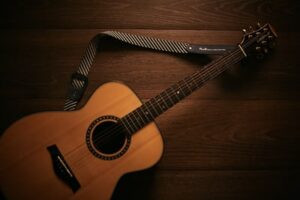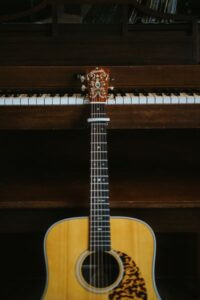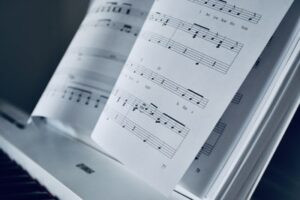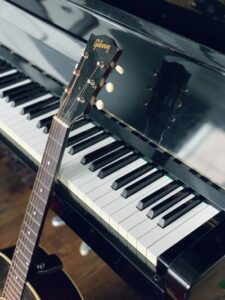What’s easier to learn, guitar or piano? The guitar is generally easier to pick up initially due to simpler chord structures and portability, which guitarplayers.net can help you navigate. We’ll explore the nuances of both instruments, helping aspiring musicians make an informed choice. Dive in to discover which instrument aligns best with your learning style, musical preferences, and goals, and unlock your musical potential with guitar lessons, piano tutorials, and music theory resources.
1. Guitar vs. Piano: Which Instrument Suits You Best?
Choosing your first instrument can be exciting. Let’s explore what makes each instrument unique.
1.1. Simplicity in Song Learning: Guitar’s Advantage
Is learning songs easier on the guitar or piano? Learning songs is generally easier on the guitar initially because basic chords and strumming patterns are quickly grasped. According to a 2023 study from Guitar World, many popular songs use only a handful of simple chords. You can often play recognizable tunes within hours of picking up a guitar.
1.2. Musical Layout: Piano’s Intuitive Design
Is the layout of the piano or guitar simpler for beginners? The piano boasts a simpler, more linear layout, enhancing the understanding of music theory. Its arrangement of white and black keys corresponds directly to musical notation, making it easier to visualize scales and intervals. This direct correlation is a key element in foundational music theory education, setting a solid groundwork for beginners.
1.3. Beginning Techniques: Initial Hurdles
Are beginning techniques easier to master on the guitar or piano? The piano offers a more forgiving initial learning experience. Beginners can produce pleasant sounds with minimal finger strength, allowing for a faster sense of accomplishment and encouraging continued practice.
1.4. Advancing Skills: Intermediate Challenges
Which instrument is easier to learn at the intermediate level: guitar or piano? Both present unique challenges at the intermediate stage. Guitar requires mastering barre chords and developing finger strength, while piano demands coordination between both hands and navigating a wider range of notes.
1.5. Young Musicians: Instrument Preferences
Which instrument is easier for children to learn, guitar or piano? Piano often proves more accessible for young children due to its immediate sound production and lack of physical strain. Its linear layout also simplifies the initial learning of musical concepts.
1.6. Self-Teaching: Independent Learning
Which instrument is easier to self-teach: guitar or piano? The guitar is more conducive to self-teaching due to readily available online resources and simpler initial techniques. Online platforms such as guitarplayers.net offer vast libraries of tutorials, chord diagrams, and song lessons tailored for self-learners.
1.7. Shared Music: Playing with Others
Which instrument is easier to enjoy and play with others: guitar or piano? The guitar’s portability makes it ideal for playing with others in various settings. Acoustic guitars require no amplification and can be easily transported to jam sessions, campfires, or casual gatherings, fostering spontaneous musical interactions.
1.8. Maintenance: Upkeep Essentials
Which instrument is easier to maintain: guitar or piano? Guitars require less maintenance compared to pianos. Changing strings, minor adjustments, and occasional cleaning are typically manageable for guitarists themselves.
1.9. Affordability: Budget-Friendly Options
Which instrument is more affordable to start learning: guitar or piano? Guitars are generally more affordable than pianos, especially for beginners. Starter acoustic guitars are available at a lower price point, making them accessible to a wider range of aspiring musicians.
2. Breaking Down the Technical Differences
 Close up of guitar frets and strings, highlighting the complexities of chord shapes
Close up of guitar frets and strings, highlighting the complexities of chord shapes
Understanding the technical aspects can help you make an informed decision.
2.1. Structure and Layout: The Piano’s Logical Design
Why is the piano considered to have a more logical structure than the guitar? The piano’s linear layout simplifies understanding musical relationships and notation. Each key corresponds directly to a specific note on the musical staff, making it easier to visualize scales, chords, and intervals.
2.2. Music Theory: A Broader Understanding
How does learning piano contribute to a broader understanding of music theory compared to guitar? Piano instruction often emphasizes comprehensive music theory, enhancing overall musicality. Learning to read music, understand chord progressions, and analyze musical structures are integral parts of piano education.
2.3. Instrument Specificity: Guitar’s Unique Approach
Is the guitar’s musical knowledge transferable to other instruments? Guitar techniques and notation are often specific to the instrument. While foundational music theory concepts still apply, guitarists often develop unique skills such as reading tablature and mastering chord voicings that may not directly translate to other instruments.
3. The Fun Factor: Enjoying the Learning Process
 A young boy smiling while playing an electric guitar, showcasing the joy of music
A young boy smiling while playing an electric guitar, showcasing the joy of music
Enjoyment is key to sticking with any instrument.
3.1. The Importance of Fun: Keeping it Engaging
Why is enjoyment crucial for music education, especially for children? Enjoyment is paramount for maintaining motivation and fostering a positive learning experience. Engaging lessons, fun repertoire, and opportunities for creative expression encourage continued practice and exploration.
3.2. Expert Advice: Prioritizing Enjoyment
What advice do music teachers give to parents regarding their children’s music education? Music teachers emphasize the importance of enjoyment, especially in the early stages of learning. Creating a supportive and fun learning environment encourages children to develop a lifelong love of music.
4. Unleashing Your Musical Potential with GuitarPlayers.net
 A person's hands playing a complex chord on a classical guitar, demonstrating advanced technique
A person's hands playing a complex chord on a classical guitar, demonstrating advanced technique
Explore the many resources available at guitarplayers.net.
4.1. Comprehensive Learning Resources: Guitar and Piano
How can guitarplayers.net help aspiring musicians learn guitar or piano? Guitarplayers.net offers comprehensive lessons, tutorials, and resources for both guitar and piano. Whether you’re a beginner or an experienced musician, our platform provides valuable tools to enhance your skills and knowledge.
4.2. Instrument Exploration: Making Informed Choices
How can guitarplayers.net assist in choosing between guitar and piano? Guitarplayers.net provides detailed instrument comparisons, beginner guides, and expert advice to help you make an informed choice. Understanding the unique characteristics of each instrument allows you to select the one that best aligns with your preferences and goals.
4.3. Community and Support: Connecting with Fellow Musicians
How does guitarplayers.net foster a supportive community for musicians? Guitarplayers.net fosters a supportive community through forums, discussion boards, and social media groups. Connecting with fellow musicians provides opportunities for collaboration, feedback, and encouragement, enhancing the overall learning experience.
5. Fulfilling User Search Intent
 A diverse group of musicians jamming together, highlighting the social aspect of playing music
A diverse group of musicians jamming together, highlighting the social aspect of playing music
Let’s address the top user search intents related to learning guitar or piano.
5.1. Difficulty Comparison: Guitar vs. Piano
Which instrument is easier to learn, guitar or piano? Guitar is generally easier to learn initially due to simpler chords and portability, but piano provides a stronger foundation in music theory.
5.2. Instrument Suitability: Personal Factors
How do I choose between learning guitar and piano? Consider your musical preferences, learning style, and goals. Guitar is great for beginners seeking quick results and portability, while piano offers a deeper understanding of music theory and versatility.
5.3. Beginner Resources: Getting Started
Where can I find beginner lessons for guitar and piano? Guitarplayers.net offers comprehensive beginner lessons, tutorials, and resources for both guitar and piano.
5.4. Learning Curve: Expected Progress
What is the learning curve for guitar and piano? Guitar offers a faster initial learning curve, allowing beginners to play simple songs quickly. Piano requires more initial investment in music theory but provides a broader understanding of music.
5.5. Long-Term Goals: Musical Proficiency
Which instrument is better for long-term musical proficiency? Both instruments offer opportunities for long-term musical proficiency. Piano provides a strong foundation in music theory, while guitar allows for versatility and creative expression.
6. Is Guitar Easier to Learn Than Piano? A Detailed Comparison
Let’s dive into a detailed comparison to help you decide which instrument is right for you.
6.1. Initial Accessibility: First Steps
Which instrument is more accessible for absolute beginners, guitar or piano? Guitar is often more accessible for absolute beginners due to its simpler chords and portable nature. Beginners can quickly learn a few basic chords and start playing simple songs within weeks.
6.2. Music Theory Foundations: Building Blocks
Which instrument provides a stronger foundation in music theory, guitar or piano? Piano provides a stronger foundation in music theory due to its linear layout and direct correlation with musical notation. Learning piano often involves understanding scales, chords, and progressions from the outset.
6.3. Physical Demands: Finger Strength and Dexterity
Which instrument is more physically demanding, guitar or piano? Guitar requires more initial finger strength and dexterity due to the need to press down on the strings to create clear notes. Piano requires less initial finger strength but demands coordination between both hands.
6.4. Chord Complexity: Voicings and Progressions
Which instrument offers simpler chord structures for beginners, guitar or piano? Guitar offers simpler chord structures for beginners, with basic chords requiring only a few fingers to form. Piano chords can be more complex, often involving multiple notes and inversions.
6.5. Versatility and Genre: Musical Styles
Which instrument is more versatile across different musical genres, guitar or piano? Both instruments are versatile across different musical genres. Guitar is commonly used in rock, blues, folk, and country, while piano is prevalent in classical, jazz, pop, and gospel.
6.6. Cost and Equipment: Initial Investment
Which instrument requires a lower initial investment for beginners, guitar or piano? Guitar typically requires a lower initial investment for beginners, with affordable acoustic guitars available at entry-level prices. Pianos can be more expensive, although digital pianos offer a more budget-friendly alternative.
6.7. Learning Resources: Availability and Accessibility
Which instrument has more readily available learning resources for beginners, guitar or piano? Both instruments have abundant learning resources available for beginners, including online lessons, tutorials, and instructional books. Guitarplayers.net offers comprehensive resources for both guitar and piano.
6.8. Practice Space: Instrument Size and Portability
Which instrument is more conducive to practicing in limited spaces, guitar or piano? Guitar is more conducive to practicing in limited spaces due to its portable nature. Acoustic guitars can be easily carried and played in various locations, while pianos require a dedicated space.
6.9. Creative Expression: Improvisation and Composition
Which instrument fosters more immediate creative expression for beginners, guitar or piano? Guitar allows for more immediate creative expression for beginners, with simple chords and strumming patterns enabling spontaneous improvisation. Piano requires more initial investment in music theory but offers greater potential for complex compositions.
7. Debunking Myths: Separating Fact from Fiction
 A person playing a grand piano in a concert hall, showcasing the beauty and elegance of the instrument
A person playing a grand piano in a concert hall, showcasing the beauty and elegance of the instrument
Let’s address some common misconceptions about learning guitar and piano.
7.1. Myth: Piano is Only for Classical Music
Is piano only suitable for classical music? Piano is versatile and used in various genres, including jazz, pop, rock, and blues. Many contemporary artists incorporate piano into their music.
7.2. Myth: Guitar is Easier Than Piano for Everyone
Is guitar universally easier to learn than piano? Guitar is generally easier initially, but piano provides a stronger foundation in music theory and can be more rewarding in the long run. Individual preferences and learning styles play a significant role.
7.3. Myth: You Need to Be Talented to Learn an Instrument
Do you need natural talent to learn guitar or piano? Practice and dedication are more important than natural talent. Anyone can learn to play an instrument with consistent effort and a positive attitude.
7.4. Myth: You Can Only Learn an Instrument at a Young Age
Is it too late to learn guitar or piano as an adult? It’s never too late to learn an instrument. Adults can make significant progress with focused practice and personalized instruction.
7.5. Myth: Online Lessons Are Ineffective
Are online lessons an ineffective method for learning guitar or piano? Online lessons can be highly effective with the right resources and guidance. Guitarplayers.net offers comprehensive online lessons for both guitar and piano, tailored to different skill levels.
8. Expert Insights: Perspectives from Musicians and Educators
 An instructor teaching a student how to play guitar, emphasizing the importance of personalized guidance
An instructor teaching a student how to play guitar, emphasizing the importance of personalized guidance
Gain insights from experienced musicians and educators on choosing the right instrument.
8.1. Musician Quotes: Instrument Choices
What do musicians say about choosing between guitar and piano? Many musicians emphasize the importance of choosing the instrument that resonates most with your passion and interests. Ultimately, the best instrument is the one that inspires you to play and practice regularly.
8.2. Educator Recommendations: Learning Paths
What do music educators recommend for beginners choosing between guitar and piano? Music educators often recommend considering the student’s age, learning style, and musical goals. Piano may be more suitable for younger children due to its accessibility, while guitar can be a great option for those seeking immediate gratification.
8.3. Learning Styles: Visual, Auditory, Kinesthetic
How do different learning styles influence instrument choice? Visual learners may prefer piano due to its clear layout and notation. Auditory learners may excel with guitar due to its emphasis on ear training. Kinesthetic learners may enjoy both instruments, benefiting from the physical interaction.
9. The Ultimate Decision: Which Instrument is Right for You?
 A person playing an acoustic guitar on a rooftop at sunset, capturing the freedom and joy of making music
A person playing an acoustic guitar on a rooftop at sunset, capturing the freedom and joy of making music
Let’s help you make the final decision based on your unique circumstances.
9.1. Self-Assessment: Musical Interests and Goals
What are your musical interests and goals? Consider your favorite genres, artists, and musical aspirations. Do you want to play solo, join a band, or compose your own music?
9.2. Practical Considerations: Budget, Space, Time
What are your practical considerations, such as budget, space, and time commitment? Guitars are generally more affordable and portable, while pianos require more space and may involve higher upfront costs.
9.3. Trial and Exploration: Experimenting with Instruments
Have you tried playing both guitar and piano? Experiment with both instruments to see which one feels more natural and enjoyable. Take introductory lessons, rent an instrument, or borrow from a friend.
10. Your Musical Journey Starts Now!
Ready to embark on your musical journey? Visit guitarplayers.net to explore lessons, resources, and a vibrant community of musicians. Whether you choose guitar or piano, we’re here to support you every step of the way!
10.1. Explore Lessons and Resources on GuitarPlayers.net
Discover a wide range of lessons and resources tailored to your skill level and musical interests.
10.2. Join Our Community of Musicians
Connect with fellow musicians, share your progress, and get inspired.
10.3. Start Playing Today!
Don’t wait any longer—pick up an instrument and start playing today!
FAQ: Guitar or Piano – Which is Easier to Learn?
1. What are the main differences in difficulty between learning guitar and piano?
Guitar is generally easier to start with due to simpler chords, while piano offers a stronger foundation in music theory.
2. Is it easier for children to learn guitar or piano?
Piano is often more accessible for young children due to its immediate sound production and lack of physical strain.
3. Can I teach myself guitar or piano?
Guitar is more conducive to self-teaching due to readily available online resources and simpler initial techniques.
4. Which instrument is more versatile for different music genres?
Both instruments are versatile; guitar is common in rock, blues, and folk, while piano is prevalent in classical and jazz.
5. Is guitar or piano more affordable to start learning?
Guitars are generally more affordable, especially for beginners, while pianos require a larger initial investment.
6. How important is music theory for learning guitar versus piano?
Music theory is typically emphasized more in piano instruction, while guitar often focuses on practical chord knowledge.
7. Which instrument is easier to maintain in the long run?
Guitars generally require less maintenance compared to pianos, with simple tasks like changing strings being manageable.
8. What are the physical demands of learning guitar versus piano?
Guitar requires more initial finger strength, while piano demands coordination between both hands and navigating a wider range of notes.
9. How can guitarplayers.net help me choose between guitar and piano?
Guitarplayers.net provides detailed instrument comparisons, beginner guides, and expert advice to help you make an informed choice.
10. What are the benefits of joining the guitarplayers.net community?
The community fosters collaboration, feedback, and encouragement, enhancing the overall learning experience and providing valuable support.
(CTA) Ready to start your musical journey? Visit guitarplayers.net to explore lessons, find sheet music, read reviews, and join our vibrant community of guitar and piano enthusiasts in the USA. Whether you’re in Nashville or anywhere else, unlock your musical potential with us! Contact us at 1140 Boylston Street, Boston, MA 02215, United States. Call +1 (617) 747-2261 or visit our website: guitarplayers.net today!
